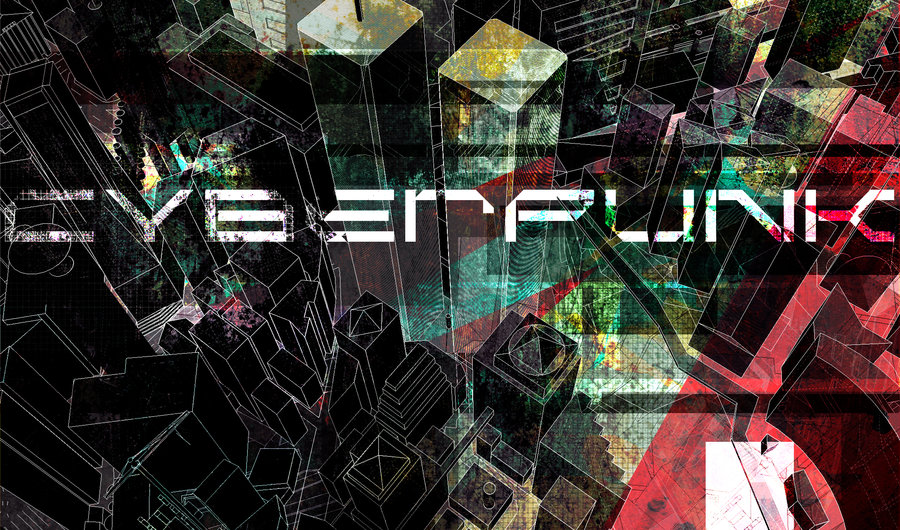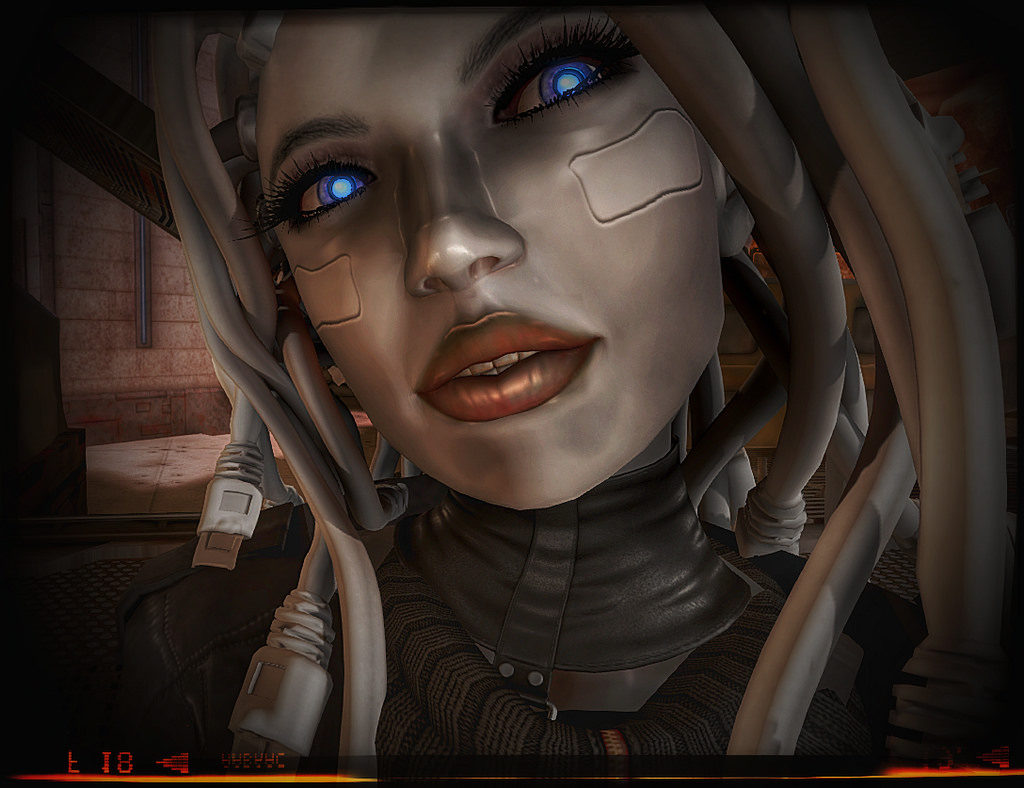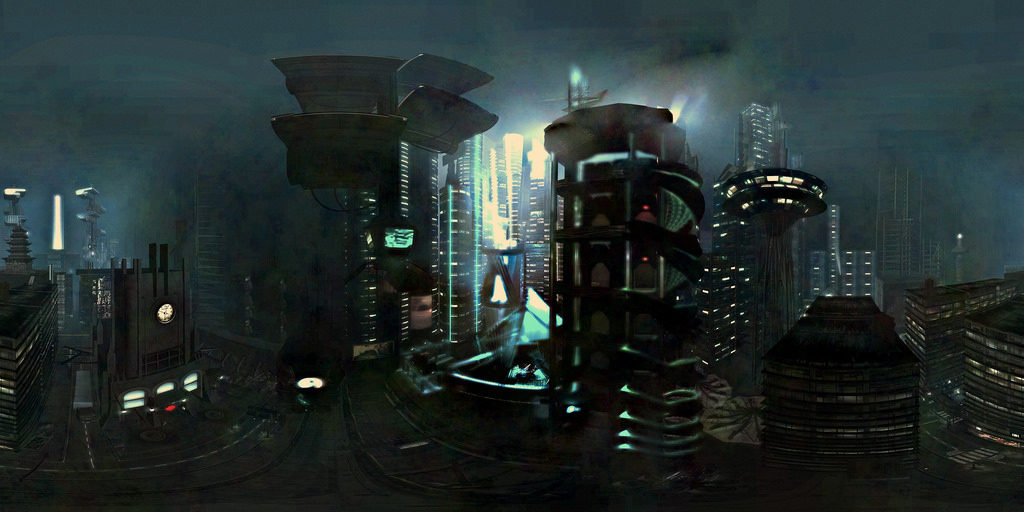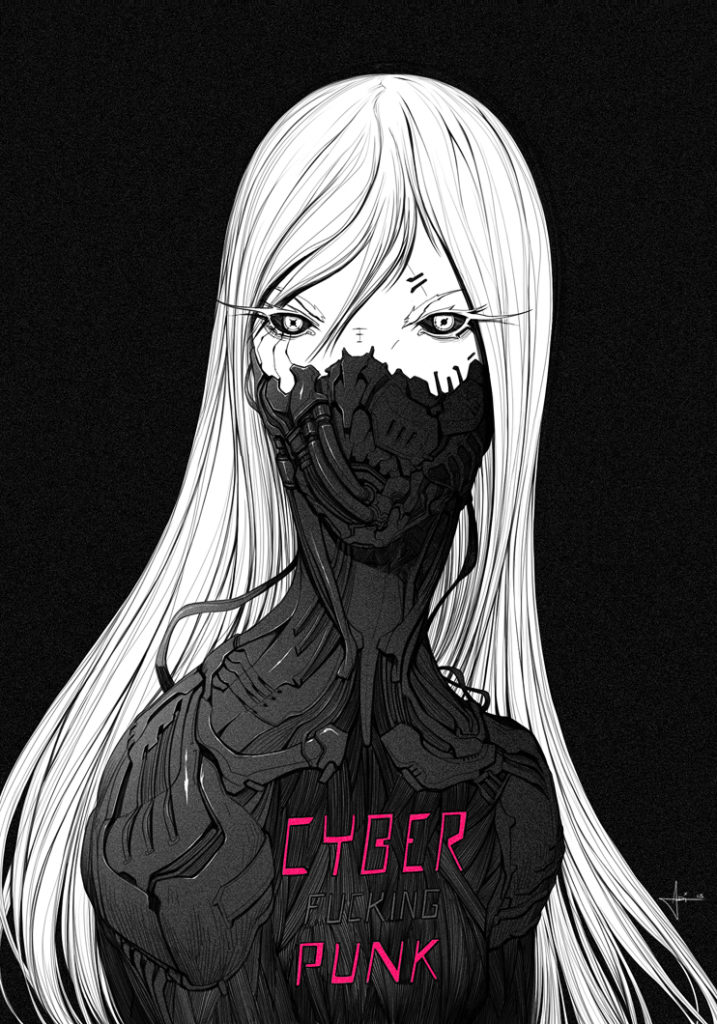
Artwork by Micah Bauer.
There are several definitions and a lot of cultural baggage attached to the word “cyberpunk”, so applying it can be contentious. What counts as cyberpunk, hmm? Who gets to decide? Most people agree that Neuromancer, Blade Runner, Ghost in the Shell: Stand Alone Complex, and the Walled City of Kowloon all qualify, but anything else is subject to much debate. Here’s my opinion — if you can answer yes to these two questions, then a given piece of media or real-world phenomenon is cyberpunk:
- Does it involve computer technology that was new or didn’t quite exist yet at the time of writing / creating / happening?
- Does it feature a shadowy corporate elite exploiting the plebeian masses?
The following sources should establish why that’s my two-part test.

Image via Jamie.
Cyberpunk: Aesthetic, Subculture, Futurist Trend, or All of the Above?
Cyberpunk originated as a fiction genre — it started with novels and now extends to anime and beyond. It’s also a political attitude, and increasingly commentators like myself claim that we already live in a tech-fueled digital dystopia. Personally, I take an expansive view of cyberpunk, and I’ll use the label for anything that demonstrates futuristic computer-based technology and scarily inequitable distributions of power.
Wordnik pulled this definition from Wiktionary, and it fits decently well: “A subgenre of science fiction which focuses on computer or information technology and virtual reality.” The relevant Wikipedia article starts with a decent overview:
“Cyberpunk is a subgenre of science fiction in a future setting that tends to focus on the society of the proverbial ‘high tech low life’; featuring advanced technological and scientific achievements, such as information technology and cybernetics, juxtaposed with a degree of breakdown or radical change in the social order. [¶] Cyberpunk plots often center on conflict among artificial intelligences and among megacorporations, and tend to be set in a future Earth, rather than in the far-future settings […] Much of the genre’s atmosphere echoes film noir, and written works in the genre often use techniques from detective fiction.”

The cyberpunk subreddit is emblazoned with the tagline “High Tech, Low Life” and its sidebar explains, “A genre of science fiction and a lawless subculture in an oppressive society dominated by computer technology and big corporations.”
The CyPunk article that describes the 1980s origins of cyberpunk is worth quoting at length:
“The word ‘cyberpunk’ first appeared as the title of a short story ‘Cyberpunk’ by Bruce Bethke […] Bethke himself tells, that the coining of the word ‘cyberpunk’ was a conscious and deliberate act of creation on his part. The story was titled ‘Cyberpunk’ from the very first draft. In calling it that, Bethke was actively trying to invent a new term that grokked the juxtaposition of punk attitudes and high technology. His reasons for doing so were purely selfish and market-driven: He wanted to give his story a snappy, one-word title that people would remember. And he really did succeed.”
Furthermore:
“The technology of cyberpunk is ultratechnology, which mixes genetic material from animal to animal, from animal to man, or from man to animal. This technology raises human embryos for organ transplants, creates machines that think like humans and humans that think like machines. This is a technology designed to keep people within the ‘system’ that dominates the lives of most ‘ordinary’ people. This is the science of controlling human functions and of electronic, mechanical and biological control systems designed to replace them.”

Image via ▓▒░ TORLEY ░▒▓.
On the Cyberpunk Forums, Sophia Andren appeases my own preference for a definition that observes rather than dictating:
“In a world saturated with violently accelerating change, the cyberpunk must find herself armed with a sharp awareness of what is going on around her. Most people seem to be apathetic about the philosophical implications of the uncanny technologies of the near future; the issues invoked by artificial intelligence, transhumanism, and the technological singularity continue to evade our collective consciousness. […] While these technologies are not inherently malign, we would rather not see what happens when they are exclusively in the hands of the corporate elite.”
Andren continues:
“Perhaps the most clandestine aspect of cyberpunk is the ethereal subculture of hackers, phreaks, netrunners, ravers, and razor girls. It is androgynous, sophisticated, and futuristic. It is also impossible to restrain as it has slipped through the cracks; it is now lost in the delicate balance between the analogue and digital worlds, avoiding both the attention and oppression of the system. With the rise of a ubiquitous internet, cyberculture has begun to permeate throughout the popular culture of modern society. Meanwhile the cyberpunk subculture remains underground, though where one ends and the other begins is often difficult to discern.”

Artwork by Adrian Dadich.
To hammer the point home, popular cyberpunk blog Neon Dystopia proclaims:
“Cyberpunk is a sub-genre of science fiction that features advanced science and technology in an urban, dystopian future. On one side you have powerful mega-corporations and private security forces, and on the other you have the dark and gritty underworld of illegal trade, gangs, drugs, and vice. In between all of this is politics, corruption, and social upheaval.”
I’m getting a little tired of quoting, so I’ll just say that TV Tropes echoes a lot of the above.
If you’ve read this far, you probably get the sense that there are varying definitions of cyberpunk, although they converge on a few points. Of course, it’s a semantic argument — the word itself only matters insofar as it determines how people allocate cultural power. The truth is that any definition will be based on past usage rather than future manifestations, and I firmly believe that cyberpunk has explanatory power when it comes to the next century. Exolymph is all about looking at our current situation and wondering what it says about where we’re going — this has always been the role of cyberpunk media.

